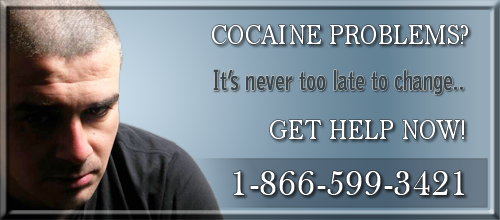About Cocaine
- What is Cocaine
- Effects of Cocaine
- Who Uses Cocaine
- Cocaine Statistics
- Cocaine Information
- Facts About Cocaine
- Dangers of Cocaine Use
- Signs of Cocaine Use
- About Cocaine
- Stages of Cocaine Addiction
- Cocaine Withdrawal
- Cocaine Overdose
- Cocaine Treatment
- Snorting Cocaine
- Smoking Cocaine
- Injecting Cocaine
- Crack Cocaine
- Using Cocaine with Alcohol
- Cost of Cocaine
- Cocaine Side Effects
- Cocaine Street Names
- Drug Tests for Cocaine
- History of Cocaine
- Cocaine User Pictures
- Cocaine Images

Cocaine Side Effects
Cocaine side effects depend on:
- how much you use
- how often and how long you use
- how you use it (by injection, orally, etc.)
- your mood, expectation and environment
- your age
- whether you have certain medical or psychiatric conditions
- whether you've taken any alcohol or other drugs (illicit, prescription, over-the-counter or herbal).
Cocaine side effects make people feel energetic, talkative, alert and euphoric. They feel more aware of their senses: sound, touch, sight and sexuality seem heightened. Hunger and the need for sleep are reduced. Although cocaine is a stimulant, some people find it calming, and feel increased self-control, confidence and ease with others. Other people may feel nervous and agitated, and can't relax.
Taking high doses of this drug for a long time can lead to these cocaine side effects:
- panic attacks
- psychotic symptoms, such as paranoia (feeling overly suspicious, jealous, or persecuted), hallucinations (seeing, hearing, smelling, etc., things that aren't real) and delusions (false beliefs)
- erratic, bizarre and sometimes violent behavior
With regular use, people may become tolerant to the euphoric effects of cocaine. This means they need to take more and more of the drug to get the same desired effect. At the same time, people who use the drug regularly may also become more sensitive to its negative effects, such as anxiety, psychosis hallucinations, loss of contact with reality) and seizures. Cocaine also makes the heartbeat and breathing faster, and raises blood pressure and body temperature.
How long do cocaine side effects last?
Not long. Cocaine is both fast- and short-acting. Intranasal use, or "snorting," takes effect within a few minutes, and lasts 60 to 90 minutes. Injecting produces a "rush" that is felt within minutes, and lasts 20 to 60 minutes. Smoking causes a high within seconds, which lasts only five to 10 minutes. When the cocaine high fades, the person may begin to feel anxious and depressed, and have intense craving for more of the drug. Some people stay high by "binging," or continually using the drug, for hours or days.
Is cocaine dangerous?
Yes. While many people use cocaine on occasion without harm, the drug can be very dangerous, whether it's used once or often. Cocaine side effects cause the blood vessels to thicken and constrict, reducing the flow of oxygen to the heart. At the same time, cocaine causes the heart muscle to work harder, leading to heart attack or stroke, even in healthy people. Cocaine raises blood pressure, which can explode weakened blood vessels in the brain.
A person can overdose on even a small amount of cocaine. Overdose can cause seizures and heart failure. It can cause breathing to become weak or stop altogether. There is no antidote to cocaine overdose.
Snorting cocaine can cause sinus infections and loss of smell. It can damage tissues in the nose and cause holes in the bony separation between the nostrils inside the nose. Smoking cocaine can damage the lungs and cause "crack lung." Symptoms include severe chest pains, breathing problems and high temperatures. Crack lung can be fatal. Injection can cause infections from used needles or impurities in the drug. Sharing needles can also cause hepatitis or HIV infection.
Cocaine use in pregnancy can have many negative cocaine side effects such as an increase risk of miscarriage and premature delivery. It also increases the chance that the baby will be born underweight. Because women who use cocaine during pregnancy often also use alcohol, nicotine and other drugs, we do not fully know the extent of the effects of cocaine use on the baby. Cocaine use while breastfeeding transmits cocaine to the nursing child. This exposes the baby to all the effects and risks of cocaine use.
Cocaine use is linked with risk-taking and violent behaviors. It is also linked to poor concentration and judgment, increasing risk of injury and sexually transmitted disease. Chronic use can cause severe psychiatric symptoms, including psychosis, anxiety, depression and paranoia. Chronic use can also cause weight loss, malnutrition, poor health, sexual problems, infertility and loss of social and financial supports.
